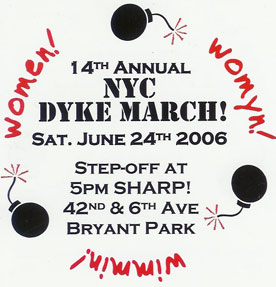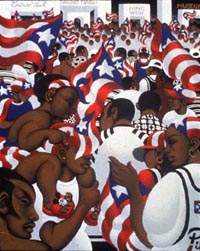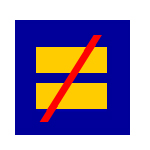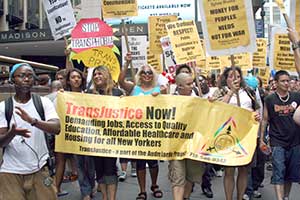
Here I am, blogging about my Pride activities from more than two weeks ago. Oops.
I frame my conversation with pictures that people took of me at the front of two very different marches. Above, a photo from Workers World of the march that occured on the Trans Day of Action (TDOA). I’m the nearly-bald one making a weird face and wearing the dorky cell phone earpiece.
As I wrote earlier, the organizers of the TDOA were denied the requested permits to march down 8th Av. When I arrived at the starting point and rally location in Chelsea Park, I was greeted by two sharply contrasting sights. First, I saw many people, trans & gender non-conforming folks and our allies, gathered together, energized, enthusiastic, strong and ready to make their voices heard. A bit off to the side of them, I saw a large group of cops, standing around with clusters of plastic handcuffs dangling from their belts.
Now, you may think that plastic handcuffs sound more mild than metal handcuffs, but let me tell you, they hurt like a motherfucker, especially when you get to wear them for hours on end as I got to when I was arrested during the Republican National Convention, and especially when they’re cruelly tightened so that they cut off circulation and cut into your skin, as was done to many of my fellow arrestees. They’re also cheap, plentiful, and quick to put onto someone’s wrists, and are therefore well suited for situations where the cops expect (or, perhaps, hope) to be arresting large groups of people. Ever since the RNC, I’ve felt more wary, nervous, and even scared than ever before whenever I’m around cops, especially when they’re in a large group. And the dangling plastic handcuffs seem like nothing so much as a threat, a message of warning to protestors: “Hey, you – stay in line, or these will go on all your wrists real quick.”
Screwing up my courage so that their presence didn’t make me veer off to the side, I walked right past those cops and joined the gathered crowd. There was a good turnout and the energy was positive and high. We started chanting to get folks focused and enthused, and then had a short program of speeches by folks from various community organizations. I was called up to speak first as a representative of the Sylvia Rivera Law Project. I was really nervous, and what with the heat, the sun, and the shouting to be heard by the crowd, I felt like all the blood was rushing to my head and I might pass out, but it also felt great to be speaking up and out and to feel SRLP’s and the TDOA’s messages being echoed and applauded by the crowd. This is part of what I said, written together with other folks from SRLP:
“The City of New York has demonstrated time and time again that it will never take meaningful action to stop the discrimination and abuse of trans people unless they are forced to do so. The fact that TransJustice was denied the permits to march down Eight Av only reaffirms the city’s disregard and disrespect for the trans community. But this demonstration, our presence here today proves that our community will not be silenced or pushed aside. We can and will make the City of NY pay us heed and pay our community the respect that we deserve. We can create the world in which we want to live, by showing our power in the streets, by building our communities, and by making our demands known loud and clear.
“We want adequate and affordable housing
We want our communities to be protected from police violence
We want equal access to health care, including trans health care and health care for trans youth
We want our community out of prisons, jails, and the juvenile prison system
We want trans people to have equal access to jobs
We want our community to have equal access to jobs and to welfare benefits when we need them
We want to be able to access services and housing in the genders we are, not genders that are forced on us
We want access to real avenues for immigration that allow people to work and live free from harassment and government surveillance
“We want true justice and true respect for all trans and gender non-conforming people, in NYC, across this country and around our world, and we will not stop struggling, we will not stop speaking out, we will not stop fighting until we get it!”
I got down, successfully not passing out, and the program continued, filled with great speakers who all drove home messages of true justice for trans and gender non-conforming people, as well as all oppressed people. One of the best things about the work of Trans Justice (the trans people of color group that organized the march) is how they tie together all forms of oppression and discrimination; they address racism, classism, poverty, sexism, and homophobia, not only as they affect trans folks but as they affect all people who are oppressed.
After the speakers finished, there was a bit of waiting and then the announcement: we would march, permit be damned. It was exciting but also scary – certainly important to stand up for our rights and be heard no matter what, but also a little worrisome, given the cops and their plastic handcuffs and the big arrest wagon that they drove alongside us as we marched down the sidewalks of 8th Av (we weren’t allowed to take the streets until we were a couple of blocks away from our ultimate destination, the LGBT Center.) But as we stepped off and started marching through Midtown, chanting all the way, my nervousness was replaced by that funny mixture of joy and controlled, focused rage that happens during a march or a protest; a sense of community strength and power, a sense of being joined together in struggle, committed to continue despite fierce opposition and repression. It was a long march, snaking uptown on 8th Av somewhere into the 40s, then turning around and coming down 7th Av and marching all the way down to the Center at 13th St. We got some crazy looks and some hostility from evening commuters as we passed Penn Station, and the cops were ever present and ever obnoxious; one cop was heard to say “You’re missing a great transgender rally. Only in New York. I got he shes and she hes.†But, all in all, it was a tremendously succesful, energizing, and empowering event.
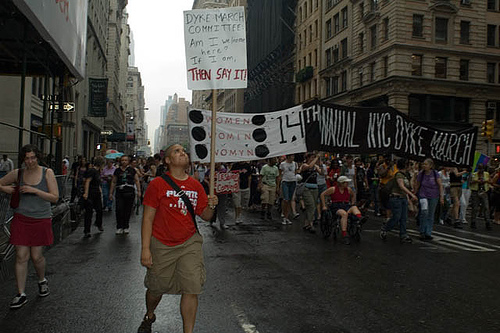
The picture above, taken by kaitlyn is of me, with my sign, at the front of the Dyke March on Saturday. The side of the sign that’s visible in the picture reads, “Dyke March Committee: Am I welcome here? If I am, THEN SAY IT!” The other side has a list of check boxes next to the following words: woman, womyn, wimmin, genderqueer butch, dyke. The boxes next to woman, womyn and wimmin are X’d out; the boxes next to genderqueer butch and dyke are checked off. (If you’re confused as to the purpose of my sign, read what I wrote earlier about my thoughts on the Dyke March. The weird face I’m making is because, by this point in the march, my sign was nearly falling off the pole and was held fast primarily by chewing gum; I’m looking up at it and willing it to not embarass me by falling off during those few minutes that I spent at the front of the march. (It didn’t.)
My girlfriend and I arrived in the vicinity of the march later than we’d expected, so we didn’t go all the way up to the starting point by Bryant Park. Instead, we waited for the march to come to us, down near the Empire State Building on 5th Av. It was the first time I’d ever seen the march coming at me instead of being in it from the start, and it gave me a little thrill to see the banner coming my way. That is, until I read the banner: “Women Wimmin Womyn.” Which, in and of itself, would not be such a big deal, but when combined with the “women only” gender policing of the march itself, was something of an unpleasant sight.
As the march approached, I held my sign high, despite feeling nervous and vaguely sheepish. There were a bunch of photographers and videographers up in front, and a few of them ran over and snapped pictures or took footage of my sign when they saw it. I got interviewed by a few folks, too. I was surprised – I definitely didn’t expect that kind of attention for me and my sign.
The march began to pass by. As usual, I saw many people I knew dispersed among the crowd. As my friend and Lt. Governor candidate Alison writes, the march “has the feel of both a powerful protest march and the largest class reunion you could imagine attending.” I saw both people I knew and strangers looking my way and taking in the sign. Lots of people smiled, clapped, or gave me a thumbs up. Some people thanked me for bringing the sign and that message to the march. A few folks told me that of course I was welcome at the march, and when I explained the women-only policy and my issues with it, some of them were surprised – they probably didn’t even know about the policy. That’s the thing about it – for all the Dyke March Committee wants to create its gender policing rules, most people never even hear about them, and many of those who do just don’t give a damn.
My sign was addressed specifically to the Dyke March Organizing Committee, so I wanted to make sure that they saw it. It seemed like the best way to do that was to march right up front. I’d mostly stayed on the sidelines until then, but down around 23rd St, I rushed up to the front. It took a little while for me to screw up the courage to step off of the sidewalk and into the street, directly in front of the big banner, but eventually I did.
After a few minutes, one of the organizers – actually one of the committee members to whom I’d spoken last year about these issues – came over to me and said that I couldn’t march in front of the banner. I pointed to my sign and asked her if, since she is a member of the committee, she could answer my question to them – was I, in fact, welcome at the march? She told me that the march was for women, for dykes. I told her that I was a butch. She responded, “Well, butches are women.” I couldn’t help but laugh a bit at this disregard for my right or ability to define my gender for myself. I told her that I identified as a butch, not as a woman, and then she told me that, in that case, she supposed that the march didn’t speak to me, and that I needed to move. I told her that I was going to enter the march, and that she should ask all the dykes around me if they wanted me to leave. As I stepped behind the banner, she told me that she wouldn’t waste her time, saying, “This march is for me.”
I continued to march, eventually stepping to the side again for the final triumphant entry into Washington Square Park. This year, the construction on the big arch in the park was finally cleared up, so for the first time in the years that I’ve been attending, the march came right through under the arch and into the park. It was a terrific sight. I stuck around for a little while, watched the crowd, and spoke with some friends. After some time, my girlfriend and I walked to the subway; I abandoned my ailing sign in a garbage can near W. 4th St; we went home.
And so ends my long, rambling, weeks-in-the-making entry on Pride. I now feel like I can return to my regularly scheduled blogging. Stay tuned.


